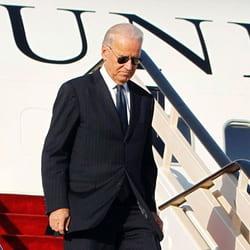By Joe Barnes|
Bonner Means Baker Fellow
President Joe Biden is a traveling man. Last week’s trip to the Middle East follows high-profile journeys to East Asia and Europe. As a candidate, Biden promised to refocus U.S. foreign policy on traditional partnerships. This summer, he fulfilled his pledge.
The choice of the Middle East reflects geopolitical reality. The United States remains deeply embedded in the region. We have major bases in the Persian Gulf and residual military deployments in Syria and Iraq. Our support for Israel, though troubled at times, remains an abiding fixture of U.S. foreign policy. We are also major arms suppliers to Arab states throughout the region, notably Saudi Arabia and the United Arab Emirates. And Washington, like partners such as Israel and Saudi Arabia, is deeply concerned about the destabilizing regional role played by Iran.
Biden’s first stop was Israel. His visit was a veritable love fest. Biden, a long-time supporter of Israel and self-declared Zionist, was clearly in his element. The absence of former Prime Minister Bibi Netanyahu, a close international partner of former President Donald Trump, was a bonus for Biden. In addition to meeting with interim Prime Minister Yair Lapid, Biden visited the West Bank and met with Palestinian leader Mahmoud Abbas. In sharp contrast to the frequently punitive position of Trump toward Palestinians, Biden offered financial support and a re-iteration of U.S. support for a two-state solution. While the latter was no doubt welcome to Palestinian ears, it was not combined with a new U.S. peace initiative. Given the dismal track record of Washington’s efforts to broker a permanent settlement between Israelis and Palestinians, Biden is unlikely to spend the diplomatic capital necessary to embark on another round of high-level negotiations.
Biden’s visit to Jeddah — where he consulted with Gulf and other Arab leaders — was more controversial. Prior to the meeting, a huge amount of international intention was focused on Biden’s meeting with Saudi Crown Prince Mohammed bin Salman. According to U.S. intelligence and other sources, MBS (as he is called) ordered the brutal murder of U.S.-based journalist Jamal Khashoggi. During the 2020 campaign, then-candidate Biden said his administration would treat Saudi Arabia a “pariah.” Biden is extremely sensitive to accusations of hypocrisy in his dealing with MBS and the Saudis. Indeed, he published an op-ed on the subject in the Washington Post prior to his trip. Whatever Biden’s discomfort, his meeting with MBS marks an important step in the international rehabilitation of the Crown Prince.
No major initiatives emerged from the Jeddah talks. The Gulf Arabs made no commitment to produce more oil, a high priority of the Biden administration. There was no change in the neutral positions toward the Ukraine war taken by countries like Saudi Arabia and the United Arab Emirates. But there was progress in further normalization of Saudi-Israeli relations, though opening Saudi airspace to Israeli commercial overflights is still far short of full diplomatic recognition. And Biden took the opportunity to reassure Gulf Arabs that the United States has no intent of abandoning the region.
Biden’s visit was a disappointment for those advocating major changes in U.S. policy toward the Middle East. This is particularly true of those who wish to see a greater emphasis on human rights and democracy.
At one level, the critics are right. U.S. foreign policy in the Middle East (and elsewhere) can be hypocritical. The painful truth is that such hypocrisy is a routine and sometimes necessary part of U.S. foreign policy. The universal values we trumpet can and do conflict with material U.S. interests. In some circumstances, our values and interests coincide. The war in Ukraine is a case in point. There, our support for a democracy against naked aggression neatly fits with our strategic concerns about Russian power. But many other foreign policy challenges lack this lucky congruence of interests and values.
For all our talk of democracy and human rights, we have long made common cause with autocrats around the world. The disconnect between soaring rhetoric and grubby reality has been particularly acute in the Middle East. In his approach to the region, Biden is largely conforming to long-standing precedent, including that of Trump. There are important differences in the Middle Eastern policies of the two administrations, notably in Biden’s push to revive the Iran nuclear deal scrapped by his predecessor. But Biden, like Trump and other previous presidents, views Tehran as a dangerous and destabilizing regional power and seeks to build an Arab and Israeli coalition to confront it. And he is willing, however begrudgingly, to cooperate with Arab autocrats on this and other issues, including moderating oil prices or encouraging rapprochement between Israel and Arab states.
Biden is capable of upsetting the status quo when it comes to foreign policy. His decision to withdraw U.S. troops from Afghanistan is an example. But in the Middle East, Biden is, for better or for worse, sticking close to the traditional U.S. playbook.
